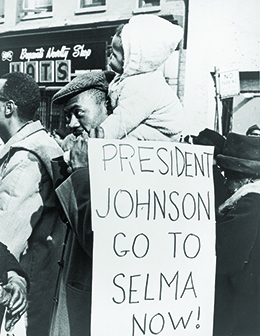| << Chapter < Page | Chapter >> Page > |
The eradication of poverty was matched in importance by the Great Society’s advancement of civil rights. Indeed, the condition of the poor could not be alleviated if racial discrimination limited their access to jobs, education, and housing. Realizing this, Johnson drove the long-awaited civil rights act, proposed by Kennedy in June 1963 in the wake of riots at the University of Alabama, through Congress. Under Kennedy’s leadership, the bill had passed the House of Representatives but was stalled in the Senate by a filibuster. Johnson, a master politician, marshaled his considerable personal influence and memories of his fallen predecessor to break the filibuster. The Civil Rights Act of 1964, the most far-reaching civil rights act yet passed by Congress, banned discrimination in public accommodations, sought to aid schools in efforts to desegregate, and prohibited federal funding of programs that permitted racial segregation. Further, it barred discrimination in employment on the basis of race, color, national origin, religion, or gender, and established an Equal Employment Opportunity Commission.
Protecting African Americans’ right to vote was as important as ending racial inequality in the United States. In January 1964, the Twenty-Fourth Amendment, prohibiting the imposition of poll taxes on voters, was finally ratified. Poverty would no longer serve as an obstacle to voting. Other impediments remained, however. Attempts to register southern African American voters encountered white resistance, and protests against this interference often met with violence. On March 7, 1965, a planned protest march from Selma, Alabama, to the state capitol in Montgomery, turned into “Bloody Sunday” when marchers crossing the Edmund Pettus Bridge encountered a cordon of state police, wielding batons and tear gas ( [link] ). Images of white brutality appeared on television screens throughout the nation and in newspapers around the world.

Deeply disturbed by the violence in Alabama and the refusal of Governor George Wallace to address it, Johnson introduced a bill in Congress that would remove obstacles for African American voters and lend federal support to their cause. His proposal, the Voting Rights Act of 1965, prohibited states and local governments from passing laws that discriminated against voters on the basis of race ( [link] ). Literacy tests and other barriers to voting that had kept ethnic minorities from the polls were thus outlawed. Following the passage of the act, a quarter of a million African Americans registered to vote, and by 1967, the majority of African Americans had done so. Johnson’s final piece of civil rights legislation was the Civil Rights Act of 1968, which prohibited discrimination in housing on the basis of race, color, national origin, or religion.

Notification Switch
Would you like to follow the 'U.s. history' conversation and receive update notifications?